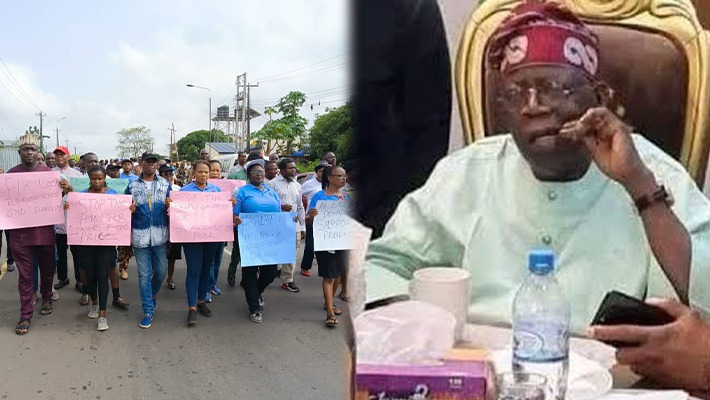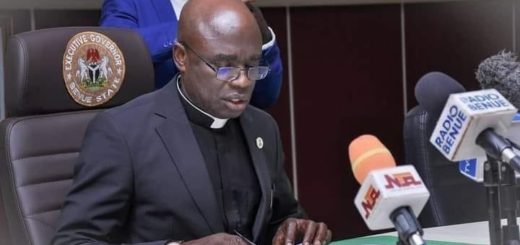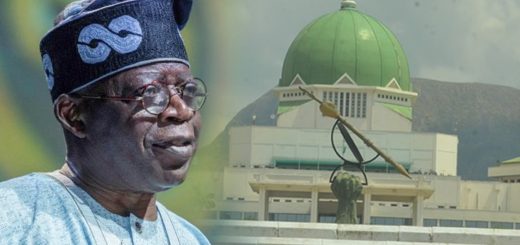FG’s reforms have not brought renewed hope promised — Catholic Bishops
 inubuThe Catholic Bishops of Owerri Ecclesiastical Province, weekend, expressed concern that the Federal Government’s reforms have not brought the renewed hope promised, while inflation, hunger and anger keep growing.
inubuThe Catholic Bishops of Owerri Ecclesiastical Province, weekend, expressed concern that the Federal Government’s reforms have not brought the renewed hope promised, while inflation, hunger and anger keep growing.
This was part of the communiqué they issued weekend, at the end of their two-day meeting, held at Sacred Heart Pastoral/Retreat Centre, Orlu, signed by the Chairman and Secretary, Most Rev. Lucius Ugorji and Most Rev. Augustine Echema, respectively.
The Bishops said: “Our nation, Nigeria, continues to face many social and economic challenges that are bringing untold hardship to our people.
“The reforms that were introduced at the inception of the current administration have not brought the renewed hope promised. Instead, inflation continues to skyrocket and hunger and anger continue to grow.
“Despite calls by the government for the people to sacrifice and bear patiently the hard times, there seems to be no corresponding example of prudent spending on the part of the leaders at all levels of government.
“It is not as if we want to join the bandwagon preaching doom and gloom for the nation, but the truth remains that for the last couple of years, we, as a nation, have missed the chance to build a strong nation, to elect leaders who have the capacity and the will to meet the needs of the people, to build a nation where the national interest overrides every tribal, political and religious division.
“We do not deny that progress has been made in particular sectors of national life; progress for which we all rejoice, yet many areas of work remain and the palpable fear is that there might be no redeeming future if things continue to go the way they are going at the moment.”
On the ongoing national hunger protest, the Catholic Bishops opined that the youths are right to be outraged by the worsening state of our nation.
“As long as many people are suffering from multi-dimensional poverty in the land; as long as there are people without the renewed hope that comes with opportunities for a decent livelihood; as long as the peoples’ income can no longer afford their genuine needs; as long as their votes cannot be guaranteed to effect a change in the behaviour of our leaders; Nigeria will continue to remain a restive nation.
“While peaceful protests are genuine democratic tools for expressing grievances, we believe that protests alone cannot resolve our current national problems. Moreover, a prolonged protest with a total close down of the country, even if peacefully sustained, might cripple our already fragile economy.”
While saying it has become imperative that Nigerians, as citizens of the same nation, undertake some soul-searching in the face of the intractable nature of our national difficulties, the Bishops also reasoned that “good governance and socio-economic stability will continue to elude us, if we collectively do not decide to strengthen our political institutions, if we do not improve transparency, efficiency, and accountability in all our public institutions.”
Continuing, the clerics said: “It will be naive for us to imagine that leadership alone can resolve all the issues that bedevil our country.
“The failure of leadership reflects equally the failure of followership. It is obvious then that both leadership and followership in Nigeria have responsibilities to fulfill, to move our nation forward.
“We need proper leadership in the various sectors and cadres of our country, be it business, politics, public service, security agencies, and other essential services. All of these different sectors must come together as part of the same wheel of progress.
“Unfortunately, what has continued to elude us is visionary leadership. Ever since our independence, one regime after another, has started and abandoned its agenda, shown a lack of continuity, and promoted mediocrity and ineptitude in governance.
“The result is that today, the majority of our citizens no longer have faith in our leaders. We call on our current political leaders and elite to rise and inspire the nation, as well as earn the trust of the populace, with policies and programmes that will improve the standard of living, economic growth, stability, and a general rise in the standard of governance and governance structure.”
Referring to the recent judgment of the Supreme Court, on local government autonomy, the Bishops appealed to the state governments to speedily organize free, fair, and transparent local government elections.
“We hope that a functional local government authority will bring development closer to the people, and allow a more grassroots participation in the democratic process,” the Bishops reasoned.
They called on Nigerian citizens to make adjustments in the context of the hard times facing everybody, stressing that “adjustment will include saying no to all corrupt practices, being alive and awake to our rights and our civic responsibilities, saying no to every attempt to cow and intimidate the citizenry”.
Their words: “Here in the South East, where years of insecurity have impacted daily life and businesses, we call on our people to re-embrace that same indomitable spirit that was displayed by our people after the Nigeria-Biafra War.
“It was a spirit that refused to accept that our present challenges are beyond redemption, a spirit that recognized that the contribution of everyone is needed to build up the society from the bottom up. This will require qualities from everyone like a life of simplicity, moral probity, steadfastness, hard work, and solidarity.
“As Church, we share in the joys and hopes, griefs and anxieties of our people. As your pastors, we feel your pains and your struggles. We are deeply concerned about the fate of our jobless youths who see no hope in the Nigerian project.
“Many have been forced to leave the country for greener pastures; others are tempted to resort to crime or fetish and obnoxious ritual practices in the quest for survival.
“Our retired and elderly people are abandoned to languish without the support networks that should guarantee a dignified and happy old age. As a Church, we do not pretend to be an alternate government that has the responsibility to manage our Commonwealth.
“The Church has always intervened in the difficult moments of our national history to promote the spirit of solidarity among the people, and concern for the welfare of those at the margins of society.
“In the same spirit, we urge better-placed individuals in the society to embrace the challenge of making sure nobody is left behind to suffer in silence and to die in misery.”













